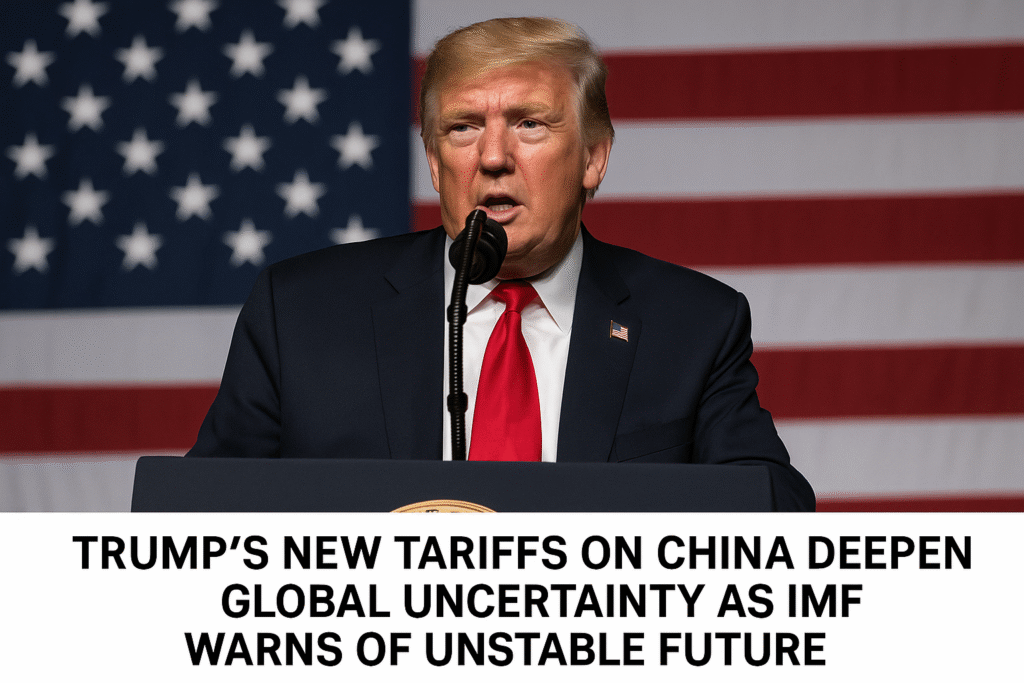By Harshit | October 12, 2025 | Washington, D.C.
Just two days after International Monetary Fund (IMF) chief Kristalina Georgieva warned that “uncertainty is the new normal,” U.S. President Donald Trump reignited global tensions with a new wave of 100% tariffs on Chinese goods, plunging financial markets into chaos and rekindling fears of a global slowdown.
The timing could not be more symbolic. As finance ministers and central bankers from around the world gather in Washington for the IMF and World Bank annual meetings this week, the global economy faces renewed turbulence—driven by trade wars, shifting alliances, and the unpredictable forces of artificial intelligence.
IMF Warns of Fragile Resilience
In her pre-meeting address at the Milken Institute, Georgieva emphasized that while the global economy has shown remarkable resilience in recent months, the test of that resilience is far from over. “Global resilience has not yet been fully tested,” she cautioned, adding that “there are worrying signs the test may come.”
Despite expectations that the U.S. will avoid a recession, thanks in part to front-loaded exports and preemptive supply chain adjustments, Georgieva noted that the cumulative impact of Trump’s tariffs and global policy instability could soon catch up with markets.
“Buckle up,” she warned earlier this week. “Uncertainty is the new normal — and it’s here to stay.”
Trump’s Tariffs Ignite Market Volatility
Global markets plunged on Friday, as Trump’s announcement of punitive 100% tariffs on Chinese imports rattled investors. The move, framed as retaliation for China’s restrictions on rare earth exports, threatens to escalate into a full-blown trade war between the world’s two largest economies.
“This is a direct counterpunch,” Trump declared, criticizing Beijing’s “hostile actions” and claiming the U.S. had “plenty of options” to reduce reliance on Chinese materials vital for defense and clean-energy technologies.
The rare earth ban by China, which controls nearly 70% of global production, has already disrupted manufacturing and defense supply chains across the West.
A Shift in Global Trade Dynamics
While the U.S. and China clash, other nations are reshaping trade routes and partnerships in a trend economists call “friendshoring.” The term, popularized by former Federal Reserve governor Janet Yellen, refers to countries deepening trade with trusted allies instead of geopolitical rivals.
Data from the United Nations Conference on Trade and Development (UNCTAD) shows that global trade grew by $500 billion in the first half of 2025, driven largely by developing economies forming new alliances. “Trade growth remained positive despite persistent geopolitical tensions,” UNCTAD reported, underscoring how businesses are adapting to bypass U.S.-China instability.
Adam Posen, director of the Peterson Institute for International Economics, described this evolution as the rise of a “new economic geography.” He said, “We’re seeing global trade reorganize around security, not just efficiency.”
The AI Boom Masks Economic Fragility
Even as trade turmoil brews, another powerful force — the artificial intelligence boom — is distorting economic data and market sentiment. According to the World Trade Organization, AI-related goods such as semiconductors, servers, and telecom equipment accounted for 20% of all global trade growth in the first half of 2025.
Investment in AI infrastructure has surged as U.S. firms pour billions into data centers, chips, and cloud systems. However, analysts warn that this boom may be concealing underlying weakness in other sectors.
As Ben May of Oxford Economics observed, “The surge in U.S. capital spending to develop AI capability has been masking weakness in other parts of the domestic economy.”
The Bank of England recently joined a growing list of institutions cautioning that inflated AI-driven stock valuations could lead to a sudden correction. “On a number of measures, equity valuations appear stretched,” it said in a report, noting that a reversal in AI optimism could trigger a sharp global market downturn.
Georgieva echoed these concerns, drawing a comparison to the dot-com bubble of the early 2000s. “Today’s valuations are heading toward levels we saw during the bullishness about the internet 25 years ago,” she warned.
Risks to U.S. Economic Credibility
Meanwhile, the Trump administration’s mix of unfunded tax cuts and attacks on institutional credibility — including criticism of the Federal Reserve — risks undermining global faith in U.S. economic leadership.
“The dollar and dollar-denominated assets remain the lifeblood of global finance,” said an IMF policy analyst. “If market confidence in U.S. fiscal credibility erodes, the repercussions will be global.”
Despite markets holding steady for now, many analysts fear that a combination of trade disruption, AI overvaluation, and policy unpredictability could soon test the very resilience Georgieva warned about.
As the IMF meetings begin, one message rings clear from Washington to Beijing: the global economy may be stronger than before — but it’s standing on increasingly shaky ground.

